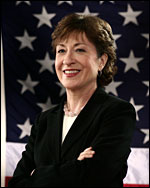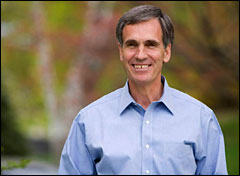Maine’s Susan Collins (R) was one of just three senators to receive a perfect score on the League of Conservation Voters’ 2007 scorecard. The next-closest Republican on the list was Collins’ home-state colleague, Olympia Snowe, who earned an 80 percent mark.

Collins’ lifetime score after 11 years in office is significantly lower — 68 percent. But over the years she has earned praise from enviros for supporting legislation to remove subsidies for oil and gas exploration, ban drilling in the Arctic National Wildlife Refuge, promote development of biomass energy technology, and address CO2 emissions — all moves that set her apart from many in her party.
But this year, Collins is facing a challenge from Democrat Tom Allen, who says that, among other things, he’ll be better on the environment than the incumbent.
Allen, the six-term congressman for Maine’s 1st district, has put his environmental record at the center of his campaign. His most recent ads have focused on energy, outlining his plan to provide a $2,000 refundable tax credit to help families cover home heating costs, force oil companies to drill on lands currently under lease, and increase investments in wind, solar, and cellulosic ethanol. He’s also called for a renewable energy standard of 25 percent by 2020, and an 80 percent reduction in greenhouse-gas emissions by mid-century.

During his time in the House, Allen authored the Mercury Export Ban Act, a bill that stops the export of mercury from the U.S. to developing countries. It passed the House in 2007 and was just passed by the Senate last week; it now heads to President Bush. Allen was a cosponsor of the Safe Climate Act. He’s the co-chair of the House Oceans Caucus, and earlier this year introduced and passed the Federal Ocean Acidification Research and Monitoring Act. He earned a 100 percent score from LCV this Congress, and has a lifetime score of 93 percent.
Allen has criticized Collins’ support of various Bush administration policies over the past eight years, including her vote in favor of the 2005 energy bill. “LCV called that the worst piece of environmental legislation ever to pass the Congress, and Susan was right there voting for it,” Allen told Grist.
The Northeast has not been very kind to Republicans over the past decade, with the number of GOP House and Senate members declining every two years. But recent polls show Collins with a 15-point lead over Allen, and most pundits expect her to coast to another victory this year. Attempts to set up an interview with Collins about this year’s race were unsuccessful, but Grist caught up with challenger Allen recently to talk about climate, energy, and the race.
Grist: It’s been 12 years since a Democrat won a Senate seat in Maine. What do you think makes this year different?
Allen: I think people are ready for a Democrat in the Senate. People like Susan Collins … she’s a familiar person to them, and she works hard. But on the big issues, there are big differences between Susan and me — on Iraq, on the Bush economic plan, the Cheney energy bill in 2005, on Medicare, [Supreme Court Justice] Sam Alito, even the torture bill and habeas corpus. I believe people in Maine are on my side. They don’t really know how Sen. Collins votes because she’s very good at expressing concern and appearing to be more moderate than she is. My basic argument is, look, if you have a senator or a candidate who is a little bit to the left of George Bush and Dick Cheney, Newt Gingrich and Tom DeLay, I suppose that’s a qualification for being in the Senate. But it’s a pretty low bar to get over, and this election is about a choice for the people of Maine between two candidates who have very different positions on the big issues.
Grist: Susan Collins is seen as a moderate, especially on environmental issues. She’s got a better environmental record than a lot of the folks on the Republican side.
Allen: But not as good of an environmental record as mine.
Grist: What’s the message you bring to voters about what sets you apart on environment and energy issues?
Allen: Take a look at the Cheney energy bill. The 2005 energy bill moved $14 billion in tax breaks and incentives to the oil and gas industry. They didn’t need them then; they don’t need them now. Now, she says, we ought to “reconsider.” They were making enormous profits then in ’05 an they didn’t need those additional tax breaks and incentives, but that’s this administration — two oil guys — [that’s] their view of what an energy bill would look like. LCV called that the worst piece of environmental legislation ever to pass the Congress, and Susan was right there voting for it.
Grist: The talking point from Republicans right now is that limiting emissions and switching off fossil fuels is going to be a catastrophe for the economy and bad for consumers. What’s the message you take to voters to counter that? The Republicans seem to be finding some success with the “drill, drill, drill” message.
Allen: Republicans in the Karl Rove era have been absolute masters at making the public afraid. If we move aggressively to invest in research and development in cutting-edge technologies that will save fuel or increase the capacity for renewable sources of energy, and rebuild our transmission infrastructure, my guess is we’re going to create millions of new jobs for the 21st century. This is a huge opportunity. They’re doing the same things they always did — the coal companies, the utilities, and the automobile companies — which is say any change will cost too much and hurt the economy. They’ve been consistently wrong since the days when Ed Muskie started working on the Clean Water Act. If you’re riddled with fear and don’t want to do anything, vote for them. If you believe you can rebuild this economy and reduce our dependence on fossil fuels and find more renewable sources of energy than coal, then our team needs to win.
Grist: You have a tip sheet on your website telling folks how to save gas and money. “Conservation” isn’t a word you hear all that often in D.C. What should the federal government be doing to promote conservation and efficiency?
Allen: We ought to be raising CAFE standards. I believe the switch to smaller cars is going to make 35 miles per gallon for a fleet in 2020 very easy to achieve, and so I’ve talked about a 55 mpg standard by 2030, which in my understanding people believe to be technologically possible. We just have to try to do everything we can to drive down demand for fossil fuels. There are so many different ways to increase conservation. We passed legislation last fall that increased efficiency standards for appliances and the CAFE standards for automobiles and trucks and also buildings. That’s all we could get by George Bush. We have to keep increasing.
Grist: It seems like “energy independence” and “clean energy” are either talked about as if they’re the same thing, or one’s talked about to the exclusion of the other on the Hill. What do we need to do to make sure that we can achieve both of those things?
Allen: We talked a lot about energy independence as a short-hand to say we need to be freer of entanglements in the Middle East. We’re borrowing money from the Chinese to buy the oil from the Saudis and other Middle Eastern countries, and this is not good for the economy, the value of the dollar, and even for the planet. I just think we’ve got to change that policy as much as we can. Whether it’s described as energy independence, or green jobs, or a green something, those are the areas we need to move in.
Now what can federal government do well? We can start with the fleet of federal vehicles, and all the federal buildings. There are plenty of businesses that are going through the same thing because they too understand the threat to the planet. Then it’s our job primarily, with leadership from a White House that understands this problem to develop nationwide policies to move the country to significantly reduce or to maximize the efficiency of its use of energy, and some of the technologies are breathtaking. Freedom from oil would go a long way to reviving the economy and preserving the planet if we can get there over a few decades.
Grist: What about coal? What role does that have in the national energy portfolio?
Allen: Coal of course is the primary, stationary source of greenhouse-gas emissions and therefore we need clean coal plants. We also need to develop the technology to capture carbon dioxide, and we have a lot of different technologies to do that — figuring out how to capture and store all of that. We’re going to be dependent on coal really for some time. It’s 50 percent of our electric generation capacity today. Solar and wind are growing and becoming more cost-effective, but it certainly is going to take a while.
Grist: If you get to craft the Allen Climate Act of 2009, what would it look like?
Allen: We’ve got to have a mandate for renewable energy, permanent tax credits for renewable energy, an economy-wide cap-and-trade program, improve federal efficiency. This would all be part of it. There are so many different components of a carbon-emissions-and-reduction-of-fossil-fuel strategy. If you reduce carbon emissions, you’re also driving down the use of oil in particular.
Grist: How important do you think environmental issues will be to Maine voters this year?
Allen: They’re not the top concern, because pocketbook issues almost always trump environmental issues. Energy issues are at the top of the list, and your climate change issues are all wrapped up in the energy issues. In that sense it will be important. Right now it’s about price — price of gas, price of food, price of fuel.
Grist: You got to watch the Senate debate about climate change from the outside this year. What would you bring to the Senate debate next year when climate legislation comes up again?
Allen: I want to be as aggressive as we can. … I would like to have federal policy be thinking about how we create jobs in the future as much as we think “how do we contain carbon emissions?” I believe if we think about both of those things at once we’ll come up with the best way of doing both at once and, therefore, something that will be best for the country.
Previous 2008 Candidate Interviews
- Mark Begich (D), Alaska Senate candidate
- Mark Warner (D), Virginia Senate candidate
- Jeanne Shaheen (D), New Hampshire Senate candidate
- Jeff Merkley (D), Oregon Senate candidate
- Jim Slattery (D), Kansas Senate candidate
- Andrew Rice (D), Oklahoma Senate candidate
- Scott Kleeb (D), Nebraska Senate candidate

